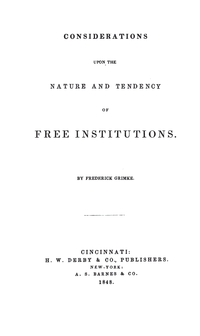Frederick Grimke
| Frederick Grimke | |
|---|---|
| Judge of the Ohio Supreme Court | |
| In office January 30, 1836 – March 2, 1842 | |
| Preceded by | Joshua Collett |
| Succeeded by | Nathaniel C. Reed |
| Personal details | |
| Born | September 1, 1791 Charleston, South Carolina |
| Died | March 8, 1863 (aged 71) Chillicothe, Ohio |
| Resting place | Grandview Cemetery |
Frederick Grimke (September 1, 1791–March 8, 1863) was a judge and author in the U.S. State of Ohio who was an Ohio Supreme Court Judge 1836-1842.
Biography
Frederick Grimke was born in Charleston, South Carolina, a son of John Faucheraud Grimké, a Revolutionary War hero and jurist in that state, and a major slaveholder. Frederick would later drop the accent from this last name. His siblings included the Grimké sisters, whose antislavery views he did not share, the attorney Thomas Smith Grimké, and Henry W. Grimké, father of the African-American leaders Archibald Grimké and Francis J. Grimké. Frederick graduated from Yale University at age 19, studied law in South Carolina, and practiced in that state before moving to Chillicothe, Ohio in 1818.[1]
From 1820 to 1836, Grimke was President Judge of the Court of Common Pleas.[1] In 1836, he was elected a Judge on the Ohio Supreme Court.[2] Throughout this time he wrote essays for the Scioto Gazette (Chillicothe) and Ohio State Journal (Columbus). In 1842, literary and philosophical studies became an obsession, and he resigned from the Supreme Court.[2][3]

In 1846, the 544 page Considerations upon the Nature and Tendency of Free Institutions was published. The historian Richard Hofstadter has described it as deserving "a place among the more important books of nineteenth-century political speculation," for its analysis of two-party political conflict.[4] Before he died during the American Civil War, he directed that one copy be delivered to the Federal Government, and one to the Confederate Government.[2] He also published Essay on Ancient and Modern Literature, where he came out firmly in favor of the modern over the Classics.[5]
Grimke died March 8, 1863[6] at his bachelor quarters at the Madeira House in Chillicothe, and it was said that when he was moved from there to the grave, not one woman followed his remains to his resting place.[2] He was interred at Grandview Cemetery (Chillicothe, Ohio).[7]
Publications
- Grimke, Frederick (1848). Considerations upon the Nature and Tendency of Free Institutions. Cincinnati: H W Derby and Company.
Notes
- ↑ 1.0 1.1 Bloomfield, p. 6.
- ↑ 2.0 2.1 2.2 2.3 Howe, p. 189.
- ↑ Bloomfield, p. 8.
- ↑ Hofstadter, p. 264.
- ↑ Bloomfield, p. 7.
- ↑ Herringshaw, Thomas William, ed. (1909). Herringshaw's national library of American biography 2. Chicago: American Publishers Assn. p. 659.
- ↑ Supreme Court.
References
- Bloomfield, Maxwell. "Frederick Grimke and American Civilization: A Jacksonian Jurist's Appraisal". Ohio History 76: 5–16.
- Hofstadter, Richard (1972). The Idea of a Party System: The Rise of Legitimate Opposition in the United States, 1780-1840. University of California Press.
- Howe, Henry (1891). Historical Collections of Ohio, The Ohio Centennial Edition 3. The State of Ohio.
-
 Wilson, James Grant; Fiske, John, eds. (1900). "Grimké,_John_Faucheraud". Appletons' Cyclopædia of American Biography. New York: D. Appleton.
Wilson, James Grant; Fiske, John, eds. (1900). "Grimké,_John_Faucheraud". Appletons' Cyclopædia of American Biography. New York: D. Appleton. - "Frederick Grimke". The Supreme Court of Ohio & The Ohio Judicial System.
Frederick Grimke at Find a Grave
|